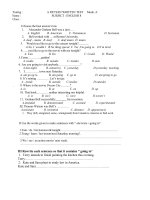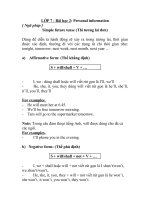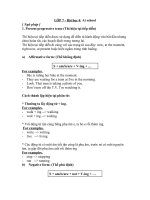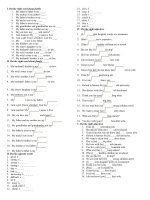Gián án Exercises for unit 8(G8)
Bạn đang xem bản rút gọn của tài liệu. Xem và tải ngay bản đầy đủ của tài liệu tại đây (70.51 KB, 4 trang )
Docs for grade 8
I. Use the correct tense of the verb in brackets:
1. They often (go) _______ for dinner on Saturday afternoon.
2. The sun (rise) ____ in the east and (set) ______ in the west.
3. My class (start) ______ at 7.00 a.m and (finish) ________ at 11.15 a.m.
4. We (receive) ________ your letter two days ago.
5. My sister (start) ________ a new job since last week.
6. Yesterday I (be) _____ busy so I (not / have) _________ time to phone you.
7. We (live) ______ in London for ten years.
8. We (not / see) _________________ each other since last week.
9. Our dad (start) _______ a new job since yesterday.
10. They help the community by (participate) __________ in the recycling program.
11. He enjoys (get) __________ up late on Sunday morning.
12. When I (be) _______ young, I used to (love) ______ this book.
13. Last night, I (go) ________ to bed late. Suddenly I (hear) ________ a noise.
14. Martha (phone) _______ me yesterday. She’s on holiday in France.
15. What ____ you (use) _____ to do in your free time? I used to go jogging.
16. My father used to (tell) ______________ us stories when I was young.
17. What ____ you (do) _________ last night? I (watch) ________TV.
18. I (read) _________ this book for two hours.
19. She likes (read) _______ comic books in the library.
20. Lan (be) _________ to the USA for 2 years.
21. We (learn) ______________ since 1999.
22. They (eat / already) _______________________ Chinese food.
23. Mr. Nam (work) _________________________ in this factory for 10 years.
24. How long ______ you (live) _______ in Hanoi? I (live) _________ there for 10 years.
25. Ba like sports, especially (play) _______ football and (swim) _______
26. You should (get) ________ up early in the morning.
27. Sandra needs (improve) _________ her English writing.
28. You should (underline) ______________ the words you want (learn) ______ .
29. Can you help me (move) __________this table?
30. What _____ they (do) ______ next summer vacation? They (visit) ____________ their parents in HCMC.
31. Nga Likes (study) ______ English.
32. It is difficult (climb) _______ the mountain
33. The members in our club (collect) _______ used paper to earn money last month.
34. She ought (practice) ________ her English more frequently.
35. Everyone stopped (laugh) ________ when I (come) ________
II. Write the questions:
1. She was late because she missed the bus (why)…………………………………………………………
2. Ba is the most sociable. (what) …………………………………………………………………………
3. Mr. Lai is short and fat. (what) ……………………………………………………………………………
4. Alexander G. Bell was born in Scotland in 1847. …………………………………………………
5. My close friend is so pretty with long black hair and a round face………………………………………
6. I have learnt English for a long time (How long)………………………………………………………….
7. Tom and Mary went to France next summer. (where) …………………………………………………
8. Scouting began in England in 1970. ……………………………………………………………..
9. They help the community by participating in recycling program. …………………………………………
10. Nga failed her English exam because she didn’t study hard. ……………………………………………
11. She stayed in bed because she was ill.
12. They used to live on the farm …………………………………….
III.Fill in the blanks with reflexive pronouns: myself, ourselves, himself, herself, themselves, itself,
1. The computer can turn ____ off if we don’t use it 9.Don’t work too hard. Enjoy ________
2. Why didn’t she buy _____ a book? 10.He is looking at ____ in the mirror
3. Last week I fell and hurt ______. 11.They ______ helped that man.
4. I and my friend, Ba draws this poster by ________. 12.Don’t worry about them. They are old enough to look after ___.
5. You should do your homework ……………….. 13.She can’t help _______, so we need to help her.
6. Make _________ at home. 14. I think the movie is interesting. Do you like _______?
7. My sister is looking at ____ in the mirror 15.Ba did Math exercises_____.
8. I think the movie is interesting. Do you like _______? 16.Last night I watched the movie Romeo and Juliet. As last
they killed _____.
VI. Turn into reported speech:
1. He said to me, “Keep silent, please” …………………………………………………………
2. The teacher told the students, “Please study harder” ……………………………………………………
3. “Please wait for me out my room”, she said to me. ……………………………………………………
4. He said to me, “Can you me meet me next week” ………………………………………………………
5. She told me, ‘Could you open the door, please” ………………………………………………………..
6. He said to her, “You should stay in bed. “ ………………………………………………………
7.He said to him, “You should not stay up late” ………………………………………………………..
8. She said to me, “Bring me a cup of tea” ………………………………………………………..
9. She said to her students, “Don’t talk in class.” …………………………………………………………
10. She told me, “Could you help me with doing that work?” ………………………………………………
11. I said to her, “I must go now.” …………,,……………………………….………
12. Nam said,” I will come to visit her tomorrow.” ………………………………..
13. She said, “I can do this test” ………………………………………………….
I: Pick out the word that has the sound pronounced differently from the others.
1. a. we b. she c. ten d. he
2. a. country b. by c. history d. city
3. a. what b. who c. where d. when
4. a. live b. time c. fine d. five
5. a. wanted b. looked c. needed d. painted
6. a. watched b. liked c. loved d. laughed
II. Arrange these verbs into columns /id/; /t/; /d/: wanted, played, helped, fitted, liked, watched, visited, looked, needed,
remembered, stopped, loved, talked, rented, missed, studied, started, used, learned, awarded, divided, decided, brushed, dressed,
fined, cried, begged, climbed, planted, covered, washed
/id/…………………………………………………………………………………………………
/t//…………………………………………………………………………………………………
/d//…………………………………………………………………………………………………
V. Choose the correct answer:
1. The woman sings the song (beautiful / beautifully)
2. You did very (good / well)
3. Our team won the games because we played (well /
good)
4. They are (good/well) students.
5. She speaks English very (quick / quickly)
6. Her English is quite (fluent / fluently)
7. She fell and hurt herself (bad / badly)
8. He speaks English (good / well)
9. Run (fast / fastly) and we catch the bus.
10. I’m sorry. I know I behave (bad / badly)
11. It is an (interesting / interestingly) film.
12. She looks (happy / happily).
13. He is a ________ player. He plays _______(good /
well)
14. She is a _______ worker. She works _____. (hard /
hardly)
16. She looks ______(beautiful / beautifully)
17. This is an (interesting / interestingly) book
VI. Correct the mistakes in the sentences :
1. He lived in this city since 2007. 2. Her bag is different to mine.
3. The meeting will be held in April 2
nd
. 4. She speaks English quite good.
5. They didn’t reported a book last week. 6. I have not seen him for last Sunday.
7. She has went to the mountain. 8. She has black long hair.
9. She ought to staying in bed. 10. She is as tall so her sister.
11. We have attended this course since two weeks. 12. He drives very careful.
13. Our father used to smoking when he was young. 14. She studies English so as to going abroad.
15. He has hair short dark. 16. He said that he is a doctor.
17. She asked me keep silent. 18. There are many differently ways of learning words
19. They are interested in do something different at weekend. 20. My book is the same of yours.
21. I have met him in the street last night.
* Reading:Young people prefer the city to the country because they love the noisy and busy life there. They also think
that it is easier to get money in the city than in the country. Therefore, more and more young people leave the country
for the city every year. Different from young people, old people like living in the country because it is not so noisy and
busy as the city. The air in the country is much fresher than the air in the city, too. Therefore, after stopping working,
many of old people move to their home villages.
1. Why do young people prefer the city to the country?
2. Why do old people like living in the country?
3. What about the air in the country?
4. Is it easier to get money in the city than in the country?
5. What do many people do after stopping working?









